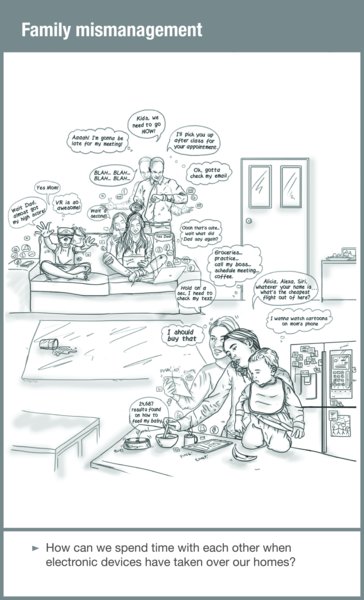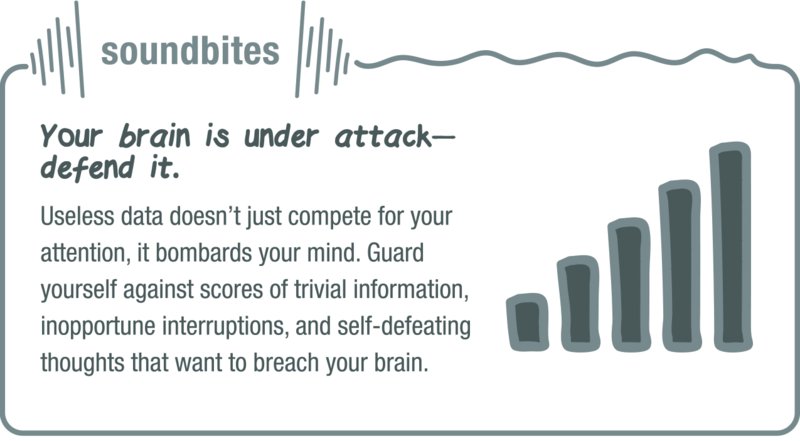Chapter 9
2050: A Parenting Odyssey
Life seemed much simpler back then.
There’s a sense of nostalgia when Emma and Liam recall what life was like when they were growing up 40 years ago. Both were born in 2010 and have fond memories of a much easier life in the decades after the new millennium.
Sitting around the family room one evening, they start to talk about how much life has changed for them. Their two teens, Stephanie and Devin, just roll their eyes and ignore them—some things haven’t changed.
The rare family conversation starts because Liam is trying, unsuccessfully, to get his daughter’s attention. She is doing homework with her global schoolmates in a virtual immersion classroom. She’s been stuck in there for hours.
After failing yet again to get his daughter to unplug and answer his quick question, Liam begins talking out loud. Nobody is listening, but he starts his rant, recalling how his life was so different from theirs. He hears himself sounding like his own parents but doesn’t stop his complaints about how tuned in his kids are and how much they’re tuning out everyone around them.
His wife Emma hears his complaining and decides to join in.
Technology Was Only a Mild Interrupter for Them
She starts remembering how her own parents would lecture her siblings back in 2025 on how much time they spent on their “smart” phones. She was barely a teen but it was part of their rant.
“Back then, my brothers and sisters were barely connected the way our kids are now. It was all so new. We didn’t realize how access to technology would spread so deep and so far into our lives,” she quips. “I recall getting started at an early age using connected devices from time to time. Streaming music, social media, texting, and online shopping was just starting to change everything. I couldn’t imagine how much further it would complicate our lives as parents.”
Her kids’ grandparents, she comments, just had tapes and CDs, listened to AM/FM car radio, and watched TV sitcoms every Thursday night back in the 1980s. And kids still drove cars and went to driver’s education.
A Carefree Time
For Liam, his stark memory is how his kindergarten class was so innocent and carefree back then.
“None of us pre-K kids had smartphones back then, and we all got driven to school by our parents or a bus driver,” he recollects. “The classroom still had books, a few tablets, and even teachers. We actually listened and talked to them and worked on projects with our classmates.”
“Paper and printers were still things we used then,” his wife chimes in.

Deep Loss of Daily Contact
Both Liam and Emma have almost no real connection with their kids each day. Pervasive technology has inserted itself into every waking—and sleeping—moment of their kids’ lives, with almost minimal need for parenting.
Liam and his wife feel like walking paychecks who are meant, seemingly, to finance their kids’ daily living. In a world almost completely disconnected from their own, they try to insert themselves, but there’s an impermeable bubble around every meaningful moment of contact with their kids. Thinking back, they wonder how much parenting has changed from when they were being raised.
There’s little room for even correcting their kids. It’s pretty hard to impart wisdom because teens have access to information and advice in almost any imaginable scenario they enter. Cameras and microphones are nearly everywhere. Small talk at dinner is a rarity because activities are so jam packed.
Struggle to Disconnect
Liam and Emma struggle to get their kids away from technology because they need to access it everywhere they go.
“We used to think that not having access to Wi-Fi was our parents’ trick, but now every inch of the earth is covered. Our kids laugh when we talk about hotspots and cell phones,” Liam observes.
Going on vacation doesn’t seem to work either anymore, for a variety of reasons. First, the kids say that they’ve “experienced” most of it already in virtual reality field trips. Second, they complain that they would have to disconnect and talk to their parents. Finally, they say it’s not as fun as their new, virtual worlds.
Technology Is with You Everywhere You Go
As Devin walks by his parents, he senses that their conversation might be uncomfortable for him, so he turns his head quickly, blinks a few times into his glasses and starts a quick video session.
His dad notices but doesn’t want to start a fight by correcting his son yet again.
“We had technology but we didn’t wear it in everything. We carried phones but now that’s all on and around them. Some people even surgically implant it,” Liam comments.
It’s Just Living for Them
Devin and Stephanie have plenty of reason to make fun of how far technology has come since their parents were young. They don’t even consider using terms like the Internet and technology; it’s just living. They laugh about the obsessions with smartphones, since cameras, sensors, and connectivity are common devices throughout every corner of society.
They laugh at how much their parents’ generation, back in 2020, obsessed with the next model smartphone, texting, and social networking because now nobody needs them. There are now screens and sensors everywhere that recognize you at any moment.
“You can’t get them off because they’re always on,” Emma says. “It’s like breathing for them.”
Why Did We Worry So Much?
“I had friends of mine text girls if they wanted to go to the dance with me. It was pretty hard work reminding them to help me out,” Liam recalls. “Their dating now requires no effort at all. I had to make a plan, but now all of that is paired automatically. It’s like the prearranged marriage centuries ago, but now an algorithm does the matching, not their parents.”
As Liam is lamenting his painstaking dating woes, his wife needs to catch herself from laughing herself to tears. On the way to her first high school dance, all the parents would get together to take the same awkward pictures, taking out their “smart” phones and sharing them online with one another afterwards. Even the limo driver waited impatiently because they all were basically taking the same shots.
It all seems so old-fashioned now, as their kids are all driven by autonomous cars and photos and videos are constantly being taken of them—not by them—wherever they go.
“I remember some of my friends having to drive themselves to school and sports and how their parents told them not to check their phones as they were driving,” Emma said. “Our parents actually bought us used cars and worried about us texting and driving. It doesn’t seem possible now that the kids get picked up and dropped off anywhere in a moment’s notice. All cars are autonomous, on a subscription, connected to everything so there’s no worry of distracted accidents anymore.”

Parenting without a Voice
As Liam and Emma are sharing these funny and sad memories, their kids aren’t hearing a word. Liam and Emma can’t change that now. Devin and Stephanie are basically out of reach from them during the day, constantly dialed in to music, friends, and artificial living.
“If they didn’t have to eat, we might never see them,” he complains. “It’s impossible talking to them when they’re gone all the time and get their learning from everything else but us. We are constantly trying to find a way back in, but it’s tough to be more engaging than all the other exciting stuff that they have access to. Parents have never seemed so boring and irrelevant.”
Fighting a Force
Emma steps in and emotionally recollects about how her parents used to punish her, give her chores and unsolicited advice. She and Liam even crave more of this time and interaction with their kids, yet they always seem to be fighting a force that was slowly developing and taking over during their childhood years.
“We all were so enamored with the emerging world of the Internet, devices, and connectivity back then,” she says. “I guess we didn’t realize just how addicting and pervasive it would all become for our kids and for us. None of us saw it coming, and we weren’t aware of how it all wasn’t going to slow down.”
Rewind
- Take a moment to think about the future and our use of technology. If you feel like you’re always connected now, how might that look 20 years down the line?
- If you’re a parent, do you notice that your kids are always tuned into their devices? Has it changed the way you communicate with them as opposed to how your parents communicated with you?
- Do you notice yourself communicating less face-to-face with family members and friends and having most of your conversations digitally?
- How have digital distractions decreased your family dynamics?
[Brief Recap]
Parents in the future will have to compete for their child’s attention with always-on connectivity. Virtual reality and other technologies may become a threat to the family structure and undermine existing family roles and interactions.
{Tune-in}
We need to monitor the use of pervasive technology. If unchecked, it can become addictive and isolating, weakening the family and personal relationships.
